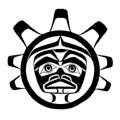
U’mista Cultural Centre
- 1 Front Street
Alert Bay , BC, V0N 1A0 - info@umista.ca
-
(250) 974-5403
(800) 690-8222 - https://www.umista.ca/
- https://www.facebook.com/Umista.Cultural.Society/
- https://www.instagram.com/umistasociety/
-
EducationMuseums & Cultural Centers
One of the objectives of the Society was the development of a facility to carry out the aims of the society. The present facility was opened in November of 1980. The focus of the permanent collection is the “Potlatch Collection”. The other permanent exhibits on display include description of the traditional ethnobiology of the Kwakwa̱ka̱ʼwakw and origin stories of the Kwakwa̱ka̱ʼwakw villages, as well as, historical and contemporary Kwakwa̱ka̱ʼwakw objects. Traveling exhibits of significance to the community are also displayed.
THE MEANING OF “U’MISTA”
The potlatch was banned in Canada between 1885 and 1951. The masks and other regalia that you see here were all confiscated after an illegal potlatch in 1921. After the ban was lifted, the Kwakwaka’wakw people fought for decades for the return of their sacred regalia that had ended up in museum and private collections around the world. Most of the regalia has come home and it is shown here at the U’mista Cultural Centre and at the Nuyumbalees Museum.
THE SOCIETY
The U’mista Cultural Society was incorporated under the British Columbia Societies Act on March 22, 1974. Since that time, it has worked towards fulfilling the mandate to ensure the survival of all aspects of cultural heritage of the Kwakwa̱ka̱ʼwakw. To facilitate the accomplishment of this mandate, the Board of Directors, composed of any person who is an individual, family of honorary member and can trace ancestry to a member of any tribe of the Kwakwa̱ka̱ʼwakw, is responsible for developing, implementing and monitoring all policy.
STAFF
The Executive Director, hired by the Board of Directors, is responsible for developing and implementing strategies that achieve the ends and aims that the Board has identified. This comprises day to day operations, management of the Centre, and yearly budget development. The staff of the society consists of one full time and three part time positions, including the Executive Director, with contract staff being hired for specific tasks. The full time staff ensures that all programming is achieved and the facility is open Tuesday to Saturday from 9:00 am to 5:00 pm (please contact us for extended summer hours; Canada Day to Labour Day).
